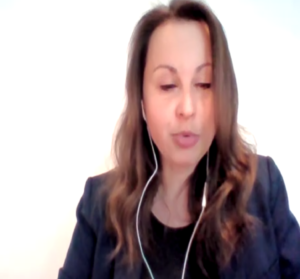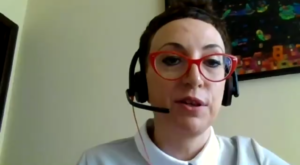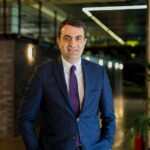 Dear colleagues,
Dear colleagues,
Ladies and gentlemen,
On behalf of the Georgian advocates, I would like to deliver warm regards to all participants of the conference.
I will start by extending my gratitude to organizers and leaders of the Polish legal profession for making this important event to happen and also many thanks to European Association of Lawyers and President Slazak.
I am convinced this conference will serve as an excellent occasion for exchange of ideas and sharing of experiences among legal professionals from different countries.
Today, I would like to concentrate your attention on those aspects of our work, which, I believe, can serve as a solid foundation for strengthening the independence of legal profession and for advancing quality administration of justice.
Therefore, I will start by emphasizing how crucially important it is that advocates in every country work hard and stay vigilant that their institutional and individual independence is respected, maintained and further promoted.
I feel proud to have been the part of a tireless work of Georgian advocates that led to our strong professional unity represented by the Georgian Bar Association – organization which is institutionally and financially fully independent from any governmental agency and which has built a capacity to effectively self-govern every aspect of profession in Georgia – starting with the admission to the profession and ending with administering the disciplinary proceedings.
Due to this level of independence and unity, we have managed to achieve the point when we have no prevalent and grave facts of interference in advocates’ work and overall the environment to conduct legal practice in Georgia is improved and approximated to European standards. For instance, one of the benchmark achievements of the recent years are that Constitutional guarantees for the work of Lawyers were introduced as well as it became punishable by criminal law to interfere in advocates’ professional activities.
However, it is also true that in every country, especially in countries of incipient democracy, there may always be the tendency and cases of undue interference in advocates’ work. For this reason it is important that besides setting-up legislative and institutional guarantees for the independence of legal profession, we also need to introduce mechanisms to permanently monitor its protection and timely react to any case that may involve the violation of advocates’ rights.
For this purpose, the special Committee on the Protection of Lawyer’s Rights operates within the Georgian Bar on permanent basis, which is directly supervised by and reports to the President of the Bar. By this way we ensure that no advocate’s complaint stays unattended and every case is checked against the standards of non-interreference in advocate’s professional activities.
Saying all this, it should also be emphasized that today we live in a world of dynamic changes. This creates the context where if we – advocates and Bar Associations – only focus on our watchdog role to ensure our independence, it will not be sufficient. Rather, we should also aim at such public positioning of our profession, which contributes to enhancing trust, prestige and reputation of advocates and their professional unions in a society. This, in turn, will have a positive spillover effect over such aspects as independence and strength of the profession.
In this regard, I would like to highlight few important points:
Firstly, as a self-governing profession, we need to pay a particular attention that standard for entry into the profession is high and it attracts even more qualified candidates to this profession.
This was a major reason the Georgian Bar have recently increased the standard of entry into the profession by amending the Law and introducing a mandatory initial training program for future advocates. The duration of this program is 1 year where candidates learn all core principles of legal profession and major skills necessary for advocates, such as ethics, rhetoric, communication with client, service fee negotiation, management of law firm and etc. Candidates are also assigned to highly experienced mentor advocates for internship.
Also, besides taking care of standards of entry into the profession, it is of key importance that Bar Associations create effective formats for lawyers to cope with a dynamic character of law. For this reason, we pay high importance to the system of continuing legal education and currently we are in the processes of redesigning our CLE system in order to make it more efficient and tailored towards the needs of advocates, including by integrating modern developments in technology and learning methodologies.
In addition, we need to ensure that ethical standards of the legal profession copes with modern challenges, including the ones created by the development of Social Media and similar platforms. We at the Georgian Bar realize that those ethical rules and procedures that were adopted years ago might not correspond to these modern challenges and therefore, in cooperation with our international partners, we plan to thoroughly assess those rules and procedures and modify it in accordance to European and international standards.
Further, we need to intensify our work to promote the role of advocate in a society. It is frequently not adequately recognized how much effort lawyers make in order for quality justice to be delivered and rule of law to be upheld. The most concerning in this regard is the problem of lawyers’ identification with their clients that in many cases leads to a huge social pressure and aggression towards advocates, especially in high-profile cases.
To address this problem, we initiated a complex campaign to protect advocates from undue social influence. For instance, we partnered with the bestseller Georgian author to write a book regarding the role of advocate and essence of their work. Also, the movie and social advertisement was created by one of the most popular Georgian movie directors regarding the history of Georgian legal profession that were broadcasted by almost all major TV channels. These activities show to have a positive impact over the public image of advocates and therefore we continue to further intensify our work in this direction.
To this end, I believe, it is also very important that advocates show themselves as representatives of socially responsible profession and engage in pro-bono activities. To promote pro-bono work among lawyers, the Georgian Bar Association, with support of partner donor organizations, has started to implement various pro-bono projects, such as free legal aid for people with disabilities, legal aid for indigent single parents as well as pro-bono days.
Despite the fact that effective state-funded legal aid system exists in Georgia, throughout implantation of the above-mentioned pro-bono projects it became apparent that there still are individuals in our society who do not fall within the mandate of the free legal aid and due to hardship cannot afford legal advice and representation. Therefore, to ensure that no one is denied justice, we currently work to set-up a Pro Bono Center within the Georgian Bar Association, which will create a platform for, advocates to more actively engage in socially responsible activities.
Adding to all of the above-mentioned, it should also be underlined that advocates and Bars should play an active role in leading and promoting the initiatives related to close cooperation among different representatives of legal profession – lawyers, judges and prosecutors.
Although Bench and Bar have significant responsibilities to collaborate in order to ensure the quality of justice and to promote public confidence,such cooperation between the key stakeholders of justice system has historically been very limited.
To tackle this challenge, upon the initiative of the Georgian Bar and in close partnership with the Supreme Court of Georgia and the Chief Prosecutors Office, a formalized mechanism of the Bench-Bar cooperation called – “Justice Coordination Council” – was established. A special ceremony for launching the mechanism was held, where myself, the Chief Justice and Attorney General jointly signed the memorandum establishing the Justice Coordination Council.
I believe that the Justice Coordination Council will enhance cooperation culture among key justice stakeholders for the common goal, such as setting uniform court practices and improving the administration of justice. It also creates a forum for judges, lawyers, prosecutors and other professionals to discuss the issues related to interpretation of law that will contribute to the development of uniform court practice, which, in turn, will enhance the predictability and transparency of judicial proceedings for the court customers.
Additionally, by development of uniform and more predictable court practices, the Justice Coordination Council will significantly diminish the risk of bias or corruption among judges. In other words, once all the justice stakeholders agree on some form of interpretation of the law and its application in court proceedings, divergence of a judge from it should have to be very well substantiated.
In the end, I would like to also highlight the importance of mutual, regional and international cooperation of Bar Associations and individual lawyers so that we can share experiences and best practices in order to support each-others progress towards more independent, strong and well functioning legal profession. In this regard, international and regional professional organizations should be more attentive towards setting-up effective mechanisms for increasing integration of Bars of countries of transitional democracy.
Particular attention should be paid to the fact that each and every of these Bar Associations operate in highly different political, social and institutional contexts. I believe that understanding of peculiarities of those local contexts is essential to streamline the process of integration of mentioned Bars in European and international family of legal professionals. In my opinion “one size fits all” approach should be avoided and “development through integration” approach should prevail.
To sum up, I believe that by safeguarding our institutional and individual independence, by ensuring higher professional standards, by promoting the role of lawyers in the society, by enhancing public image of advocates, by encouraging bench-bar cooperation and by intensifying international cooperation we will ensure further progress for legal profession as well as justice systems in our respective countries.
In the end, I would like to thank again the organizers for delivering this event and all of you for your kind attention.
David Asatiani
President of the Georgian Bar Association

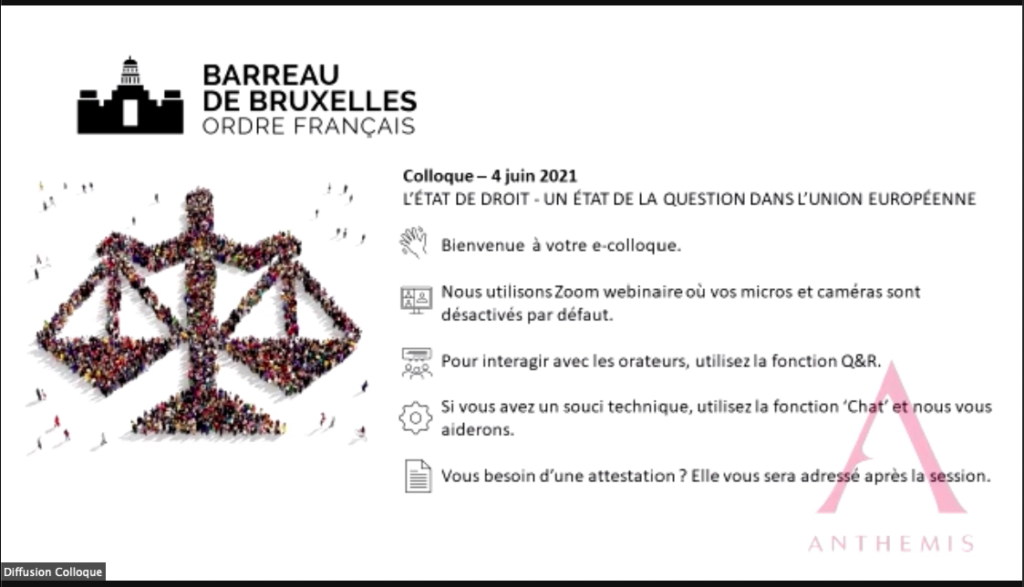 On Friday, June 4, 2021, a very interesting and live debate took place in Brussels, where lawyers, judges and other stakeholders met to discuss the erosion of rule of law principle in the European Union. The discussion followed a Communication from the Commission to the European Parliament, the Council, The European Economic and Social Committee and the Committee of Regions – 2020 Rule of Law Report.
On Friday, June 4, 2021, a very interesting and live debate took place in Brussels, where lawyers, judges and other stakeholders met to discuss the erosion of rule of law principle in the European Union. The discussion followed a Communication from the Commission to the European Parliament, the Council, The European Economic and Social Committee and the Committee of Regions – 2020 Rule of Law Report.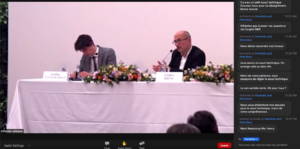 Apart from general observations, Commission’s material includes country reports from each Member State. As the main organizer of the colloquium was the Brussels Bar Association (French-speaking), one of the presentations focused on Belgium noticing relatively good situation in the country, however during the discussion some participants pointed out the lack of confidence in political leaders, arbitrary and repressive decisions taken in the context of Covid-19 pandemic as well as problems with overlapping competencies of federal and regional authorities provoking institutional conflicts.
Apart from general observations, Commission’s material includes country reports from each Member State. As the main organizer of the colloquium was the Brussels Bar Association (French-speaking), one of the presentations focused on Belgium noticing relatively good situation in the country, however during the discussion some participants pointed out the lack of confidence in political leaders, arbitrary and repressive decisions taken in the context of Covid-19 pandemic as well as problems with overlapping competencies of federal and regional authorities provoking institutional conflicts.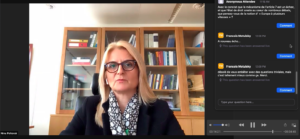 can adopt a political perspective, rather than a legal one. Therefore, it is necessary to emphasise specific tasks of the Court of Justice of the European Union, which is entitled to examine the compliance of national law with Community law and thus can protect the rule of law in the Member States to a greater extent than other EU bodies. This role of the Court was presented by the Polish judge Nina Półtorak. Nevertheless, even the best efforts of EU courts would not be effective if the Member States do not enforce their judgments.
can adopt a political perspective, rather than a legal one. Therefore, it is necessary to emphasise specific tasks of the Court of Justice of the European Union, which is entitled to examine the compliance of national law with Community law and thus can protect the rule of law in the Member States to a greater extent than other EU bodies. This role of the Court was presented by the Polish judge Nina Półtorak. Nevertheless, even the best efforts of EU courts would not be effective if the Member States do not enforce their judgments.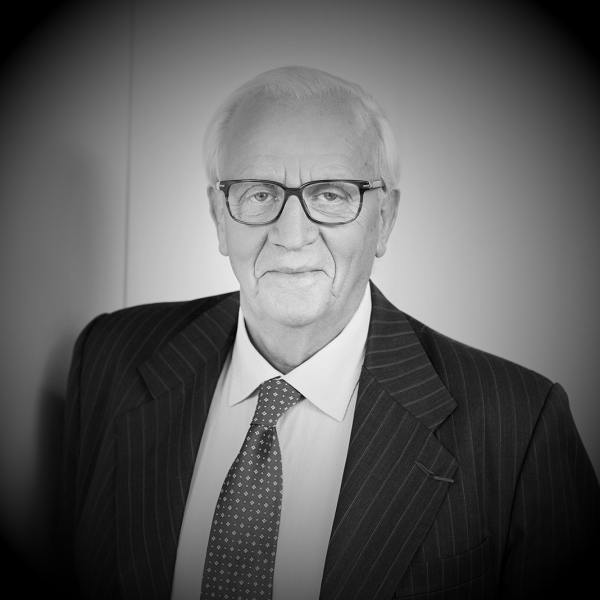 With huge regret, sadness and disbelief we have received a very recent information that Jean-Pierre van Cutsem passed away today. Jean-Pierre was a Founding Father of the AEA-EAL, its former President, active Member of the Board of Directors and for more than three decades the main pillar and spiritus movens of our Association. He was a wonderful Colleague and Friend, for so many – Mentor and Guide.
With huge regret, sadness and disbelief we have received a very recent information that Jean-Pierre van Cutsem passed away today. Jean-Pierre was a Founding Father of the AEA-EAL, its former President, active Member of the Board of Directors and for more than three decades the main pillar and spiritus movens of our Association. He was a wonderful Colleague and Friend, for so many – Mentor and Guide.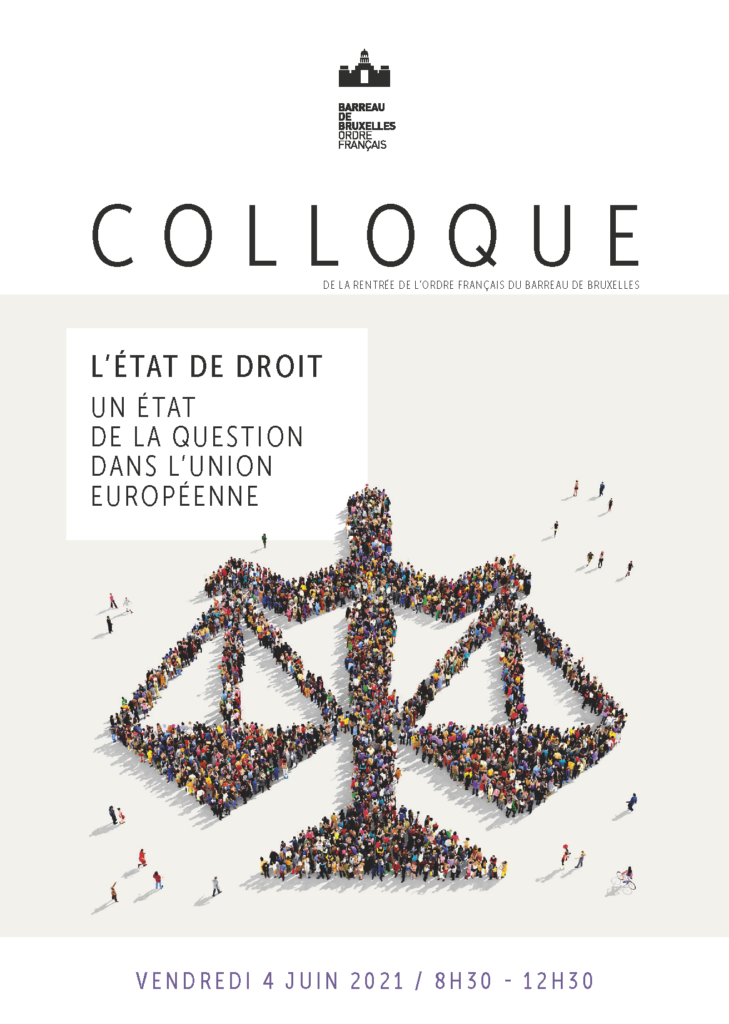
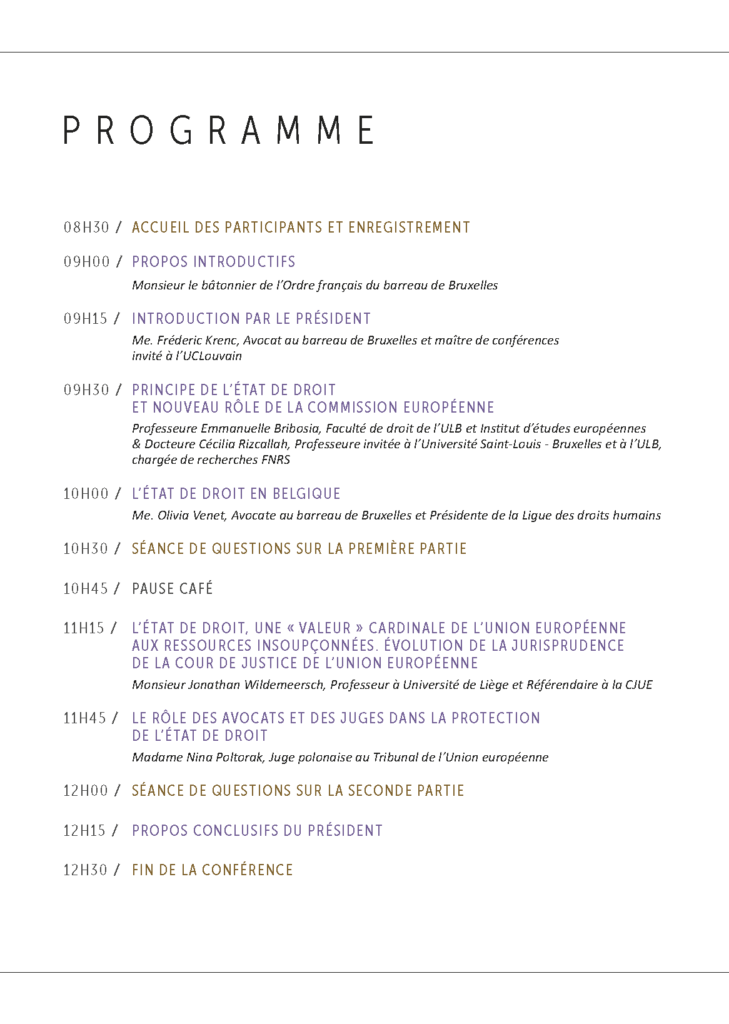
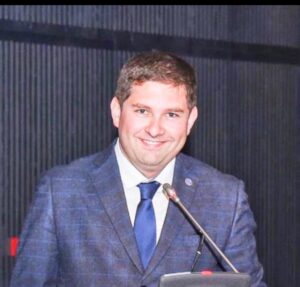 The AEA-EAL Board of Directors appointed Professor Irakli Kandashvili (Georgia) for the position of the Chair of the Committee. Irakli is an Attorney in Georgia and licensed mediator at Tbilisi City Court, accredited by Center of Effective Dispute Resolution (CEDR London Office) as well as a first ever Labour Mediator in Georgian legal history (February-March 2014). Irakli is one of licensed and accredited mediator by International Training Center of International Labor Organization (ILO) in Mediation of Labour Disputes (April 2019). Irakli is a Chair of Mediators Association of Georgia from 2019 as well as Board Member of Georgian Bar Association (GBA), dealing with CLE and Education Programs for Georgian lawyers, as well as is dealing with international donor organisations for GBA in Georgia.
The AEA-EAL Board of Directors appointed Professor Irakli Kandashvili (Georgia) for the position of the Chair of the Committee. Irakli is an Attorney in Georgia and licensed mediator at Tbilisi City Court, accredited by Center of Effective Dispute Resolution (CEDR London Office) as well as a first ever Labour Mediator in Georgian legal history (February-March 2014). Irakli is one of licensed and accredited mediator by International Training Center of International Labor Organization (ILO) in Mediation of Labour Disputes (April 2019). Irakli is a Chair of Mediators Association of Georgia from 2019 as well as Board Member of Georgian Bar Association (GBA), dealing with CLE and Education Programs for Georgian lawyers, as well as is dealing with international donor organisations for GBA in Georgia.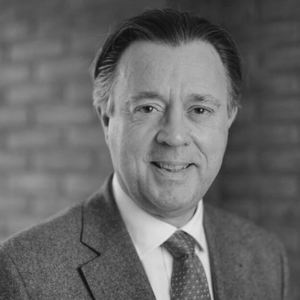 Michel Forges (Belgium) is an immediate Past Dean (“Bâtonnier”) of the Ordre Français du Barreau de Bruxelles (Brussels Bar) as well as former Member of the Board of Directors and former Treasurer of the AEA-EAL. Michel is the founder of Faber Inter Legal, recognized specialist in civil. computer and security law. He is the author of numerous publications and regularly participates in conferences on these subjects. He has taught commercial and corporate law at the University of Mons as a lecturer. He is also a former assistant at the UCL Faculty of Law and an honorary deputy judge at the Tribunal de commerce francophone de Bruxelles. Michel is a certified mediator. He is frequently appointed as an arbitrator.
Michel Forges (Belgium) is an immediate Past Dean (“Bâtonnier”) of the Ordre Français du Barreau de Bruxelles (Brussels Bar) as well as former Member of the Board of Directors and former Treasurer of the AEA-EAL. Michel is the founder of Faber Inter Legal, recognized specialist in civil. computer and security law. He is the author of numerous publications and regularly participates in conferences on these subjects. He has taught commercial and corporate law at the University of Mons as a lecturer. He is also a former assistant at the UCL Faculty of Law and an honorary deputy judge at the Tribunal de commerce francophone de Bruxelles. Michel is a certified mediator. He is frequently appointed as an arbitrator.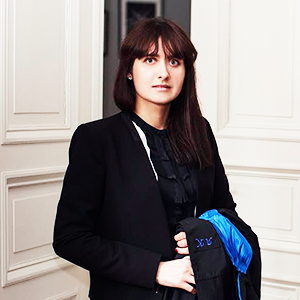 Anna Kaczyńska (Poland) is a lawyer admitted to the Łódź Bar of Attorneys-at-law. She graduated Law Faculty of the Łódź University and also studied law at Université de Pau et des Pays de l’Adour in Pau (France, Aquitaine). Anna practices a variety of legal areas especially the civil law (including protection of personal rights, claims for compensation, contract law, inheritance and family law), economic, business and commercial law, medical law, bankruptcy law, intellectual property law, labour and social security law, administrative law and personal data protection law. Anna regularly participates in specialised legal conferences and trainings She is a practicing mediator.
Anna Kaczyńska (Poland) is a lawyer admitted to the Łódź Bar of Attorneys-at-law. She graduated Law Faculty of the Łódź University and also studied law at Université de Pau et des Pays de l’Adour in Pau (France, Aquitaine). Anna practices a variety of legal areas especially the civil law (including protection of personal rights, claims for compensation, contract law, inheritance and family law), economic, business and commercial law, medical law, bankruptcy law, intellectual property law, labour and social security law, administrative law and personal data protection law. Anna regularly participates in specialised legal conferences and trainings She is a practicing mediator.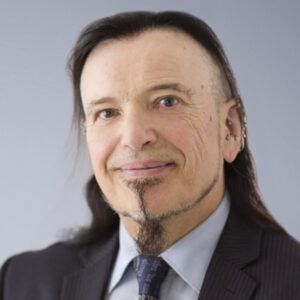 Iain G. Mitchell QC (Scotland – UK) was called to the Scottish Bar in 1976, and took silk in 1992. He was called to the English Bar and commenced practice in England in 2012. He was accredited as a mediator by the Mediation Bureau (Scotland) in 1997 and by Mediation Forum Ireland in 2007. He is a member of the Scottish Council for International Arbitration and sat on the bench as a Temporary Sheriff from 1992 to 1997. Iain is an experienced litigator with a wide and varied civil practice, with strengths in Business and Banking law, European Law, Public Procurement Law, Employment Law and Public Law, as well as being rated by Chambers Directory in Band 1 for both Information Technology and Public Procurement law and the only Scottish Silk recommended by the Legal 500 for Intellectual Property and Information Technology Law.
Iain G. Mitchell QC (Scotland – UK) was called to the Scottish Bar in 1976, and took silk in 1992. He was called to the English Bar and commenced practice in England in 2012. He was accredited as a mediator by the Mediation Bureau (Scotland) in 1997 and by Mediation Forum Ireland in 2007. He is a member of the Scottish Council for International Arbitration and sat on the bench as a Temporary Sheriff from 1992 to 1997. Iain is an experienced litigator with a wide and varied civil practice, with strengths in Business and Banking law, European Law, Public Procurement Law, Employment Law and Public Law, as well as being rated by Chambers Directory in Band 1 for both Information Technology and Public Procurement law and the only Scottish Silk recommended by the Legal 500 for Intellectual Property and Information Technology Law.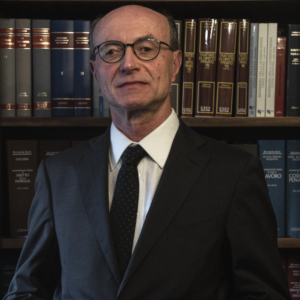 Paolo Sguotti (Italy) is a founding member of the law firm Sguotti Bertelli & Associates, active in Padova since 1981. He is responsible for civil law department (preventive counselling, contract management, corporate planning, investment and taxation, counsel and services on insolvency law), tax law department and international and Community law department. He has held positions of bankruptcy trustee. He is a member of the Board of Directors of the AEA-EAL. He has been collaborating for years with Sandro Merz in the drafting of several practical and legal manuals (Cedam/Wolters Kluwer), published in many editions. He graduated at the University of Padova with a thesis on tax law. He is a member of the Padua Bar Association and is entitled to represent clients before the Italian High Court.
Paolo Sguotti (Italy) is a founding member of the law firm Sguotti Bertelli & Associates, active in Padova since 1981. He is responsible for civil law department (preventive counselling, contract management, corporate planning, investment and taxation, counsel and services on insolvency law), tax law department and international and Community law department. He has held positions of bankruptcy trustee. He is a member of the Board of Directors of the AEA-EAL. He has been collaborating for years with Sandro Merz in the drafting of several practical and legal manuals (Cedam/Wolters Kluwer), published in many editions. He graduated at the University of Padova with a thesis on tax law. He is a member of the Padua Bar Association and is entitled to represent clients before the Italian High Court. Luiza Romanadze (Ukraine) is the Vice-President of the Ukrainian Academy of Mediation, Lawyer, Mediator, Chairman of the National Project Committee of the Association of Mediators of Ukraine, Head of the Department of Law of Odessa National University of Economics, Associate Professor of intellectual property law and corporate law of the National University „Odessa Law Academy”. Luiza was a speaker on number of conferences, seminars and workshops on ADR issues in Germany, Moldova and Ukraine. She is also author of a number of scientific articles on mediation.
Luiza Romanadze (Ukraine) is the Vice-President of the Ukrainian Academy of Mediation, Lawyer, Mediator, Chairman of the National Project Committee of the Association of Mediators of Ukraine, Head of the Department of Law of Odessa National University of Economics, Associate Professor of intellectual property law and corporate law of the National University „Odessa Law Academy”. Luiza was a speaker on number of conferences, seminars and workshops on ADR issues in Germany, Moldova and Ukraine. She is also author of a number of scientific articles on mediation.
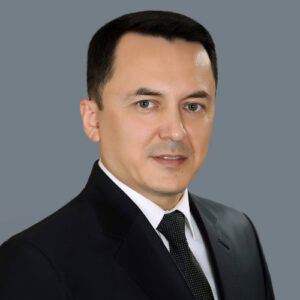 Djamshid Turdaliev (Uzbekistan), LLM, is the Founding Partner and Attorney at Law of the Law Firm “My Lawyer” Law Firm. Djamshid is a lawyer, Senior Lecturer at the Tashkent State University, professional mediator, member of the Executive Board of the Chamber of Advocates of the Republic of Uzbekistan and head of the working group on elaboration of the concept of development of the Bar and the draft of a new law on advocacy and legal practice.. He graduated law at Tashkent State University (LLB), University of Essex (LLM) and The London School of Economics and Political Science (LSE).
Djamshid Turdaliev (Uzbekistan), LLM, is the Founding Partner and Attorney at Law of the Law Firm “My Lawyer” Law Firm. Djamshid is a lawyer, Senior Lecturer at the Tashkent State University, professional mediator, member of the Executive Board of the Chamber of Advocates of the Republic of Uzbekistan and head of the working group on elaboration of the concept of development of the Bar and the draft of a new law on advocacy and legal practice.. He graduated law at Tashkent State University (LLB), University of Essex (LLM) and The London School of Economics and Political Science (LSE). Dear colleagues,
Dear colleagues,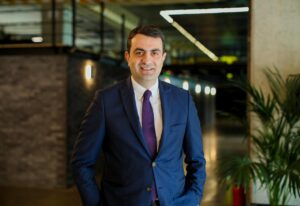 We are pleased to announce that Board of Directors of the European Association of Lawyers (AEA-EAL) unanimously elected David Asatiani (Georgia) for the post of Vice-President of our Association. David has been serving as member of the AEA-EAL Board for more than 3 years being devoted, active and engaged Colleague. During that time, he contributed with many actions, including organization of four big international conferences in Georgia. We are fully convinced that his energy, innovative approach towards cooperation of legal professionals and enhanced international contacts will boost AEA-EAL activities.
We are pleased to announce that Board of Directors of the European Association of Lawyers (AEA-EAL) unanimously elected David Asatiani (Georgia) for the post of Vice-President of our Association. David has been serving as member of the AEA-EAL Board for more than 3 years being devoted, active and engaged Colleague. During that time, he contributed with many actions, including organization of four big international conferences in Georgia. We are fully convinced that his energy, innovative approach towards cooperation of legal professionals and enhanced international contacts will boost AEA-EAL activities.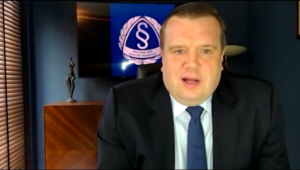 During the opening speech Włodzimierz Chróścik, President of the Polish National Bar of Attorneys-at-law noted that independence is a core value common for all lawyers, regardless of their jurisdiction and legal culture and free lawyers are indispensable for a democratic society.
During the opening speech Włodzimierz Chróścik, President of the Polish National Bar of Attorneys-at-law noted that independence is a core value common for all lawyers, regardless of their jurisdiction and legal culture and free lawyers are indispensable for a democratic society. 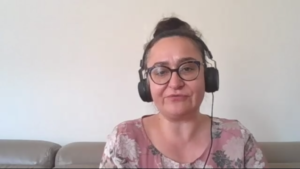 Monika Całkiewicz, Dean of the Warsaw Bar of Attorneys-at-law said that one of the crucial conditions for lawyers’ independence is a free and self-governing bar association. Ara Zohrabyan, Chairman of the Armenian Bar Association, spoke on guarantees for advocates in his country. Advocates’ independence is guaranteed in the Armenian constitution and in other legal acts, however, there is a problem of „inequality of arms”. The state has all
Monika Całkiewicz, Dean of the Warsaw Bar of Attorneys-at-law said that one of the crucial conditions for lawyers’ independence is a free and self-governing bar association. Ara Zohrabyan, Chairman of the Armenian Bar Association, spoke on guarantees for advocates in his country. Advocates’ independence is guaranteed in the Armenian constitution and in other legal acts, however, there is a problem of „inequality of arms”. The state has all 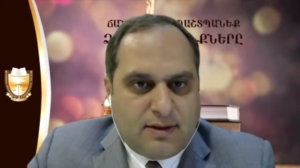 powers, police, prosecutors, and secret services. The lawyer has only his knowledge, know-how, and procedural safeguards. Therefore, it is crucial that this single advocate has a strong Bar Association, which can defend him. Ara described also the main guarantees for lawyers related to freedom of speech, a search of his/ her property, or seizure lawyer’s documents. Professor Liudmila Uliashyna, Head of the Committee Program “Law, Political Science, and Economics”, Centre for Constitutionalism and Human Rights of the European Humanity University, presented exhaustive information on the formal and practical persecutions of lawyers and the situation of the legal profession in Belarus. She noted that the situation in Belarus is exceptional. Lawyers, human rights defenders, and all other legal practitioners are acting in de facto martial law state.
powers, police, prosecutors, and secret services. The lawyer has only his knowledge, know-how, and procedural safeguards. Therefore, it is crucial that this single advocate has a strong Bar Association, which can defend him. Ara described also the main guarantees for lawyers related to freedom of speech, a search of his/ her property, or seizure lawyer’s documents. Professor Liudmila Uliashyna, Head of the Committee Program “Law, Political Science, and Economics”, Centre for Constitutionalism and Human Rights of the European Humanity University, presented exhaustive information on the formal and practical persecutions of lawyers and the situation of the legal profession in Belarus. She noted that the situation in Belarus is exceptional. Lawyers, human rights defenders, and all other legal practitioners are acting in de facto martial law state. 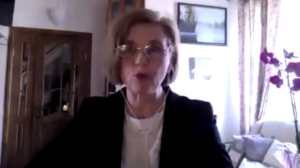 Firstly, professor Uliashyna described how the legal profession in Belarus was systematically harassed, legally limited in its powers, and persecuted for regular lawyers’ work. Secondly, she talked about the main tool used for silencing independent lawyers by the Ministry of Justice – the possibility of revoking a lawyer’s license for professional practice. Thirdly, she spoke about criminal means used against lawyers by the state: arrests and detentions, false accusations, persecution for public information about cases, open violations of legal guarantees, etc. It has to be underlined that people’s right to be represented by a lawyer was almost totally eliminated in administrative cases (most fines are imposed in that kind of proceedings) and recent amendments to the Law on Advocacy eliminated individual and private law offices. Liudmila Uliashyna called for international solidarity and to undertake interventions in every case of violation of lawyers’ rights in Belarus.
Firstly, professor Uliashyna described how the legal profession in Belarus was systematically harassed, legally limited in its powers, and persecuted for regular lawyers’ work. Secondly, she talked about the main tool used for silencing independent lawyers by the Ministry of Justice – the possibility of revoking a lawyer’s license for professional practice. Thirdly, she spoke about criminal means used against lawyers by the state: arrests and detentions, false accusations, persecution for public information about cases, open violations of legal guarantees, etc. It has to be underlined that people’s right to be represented by a lawyer was almost totally eliminated in administrative cases (most fines are imposed in that kind of proceedings) and recent amendments to the Law on Advocacy eliminated individual and private law offices. Liudmila Uliashyna called for international solidarity and to undertake interventions in every case of violation of lawyers’ rights in Belarus. 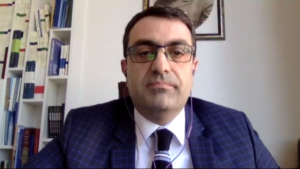 David Asatiani, President of the Georgian Bar Association and AEA-EAL Vice-President, gave a Georgian perspective on the way ahead for the progress of the legal profession. He focused on elements that may make the legal profession and the whole justice system stronger. He underlined that the key factor should be the profession’s unity towards the state. Every state, also democratic, has a tendency to eliminate independent institutions, which may watch its actions. Therefore, a strong Bar Association, independent organizationally and financially is a crucial condition for lawyers’ independence. In this context, it is very important to monitor constantly every activity of state institutions that may lead to limitations on citizens’ rights and legal guarantees for lawyers. Another important issue is protecting and building social trust in the profession. Therefore, entry conditions for future lawyers should be as high as possible to select people with the best moral and intellectual standards. To deal with judges and prosecutors, Georgian Bar Association, the Supreme Court, and Prosecutor General created a Consultative Council to discuss issues of common interest and to undertake common efforts to improve the Georgian justice system. David underlined also the significance of international cooperation between Bars and individual lawyers.
David Asatiani, President of the Georgian Bar Association and AEA-EAL Vice-President, gave a Georgian perspective on the way ahead for the progress of the legal profession. He focused on elements that may make the legal profession and the whole justice system stronger. He underlined that the key factor should be the profession’s unity towards the state. Every state, also democratic, has a tendency to eliminate independent institutions, which may watch its actions. Therefore, a strong Bar Association, independent organizationally and financially is a crucial condition for lawyers’ independence. In this context, it is very important to monitor constantly every activity of state institutions that may lead to limitations on citizens’ rights and legal guarantees for lawyers. Another important issue is protecting and building social trust in the profession. Therefore, entry conditions for future lawyers should be as high as possible to select people with the best moral and intellectual standards. To deal with judges and prosecutors, Georgian Bar Association, the Supreme Court, and Prosecutor General created a Consultative Council to discuss issues of common interest and to undertake common efforts to improve the Georgian justice system. David underlined also the significance of international cooperation between Bars and individual lawyers. 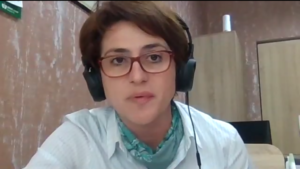 Angela Popil, a member of the Board of the Moldova Bar Association, spoke on threats and challenges for Moldovan lawyers during the coronavirus pandemic period. She also described the experiences of Moldovan lawyers in recent times. Since 2002 there are legal guarantees for the independence of advocates and the Bar and this year’s amendments strengthened the independence of the profession. Also, in this country state authorities tried to persecute lawyers for their professional activity (cases were successfully resolved in 2019). The main problem is the identification of lawyers with their clients, which is the case not only in relation to the public but – sometimes – to authorities. The pandemic period came with several restrictions and limitations imposed by the state like problems with access to imprisoned and arrested clients, the closing of courts, and many further measures well-known in other countries. Another issue is a lack of continuing professional education and no control of access to the profession (i.e., examination) for former judges, who are entitled to become lawyers without any entry conditions. The bright side of the pandemic period is the faster digitalization of the Bar and the Administration of Justice.
Angela Popil, a member of the Board of the Moldova Bar Association, spoke on threats and challenges for Moldovan lawyers during the coronavirus pandemic period. She also described the experiences of Moldovan lawyers in recent times. Since 2002 there are legal guarantees for the independence of advocates and the Bar and this year’s amendments strengthened the independence of the profession. Also, in this country state authorities tried to persecute lawyers for their professional activity (cases were successfully resolved in 2019). The main problem is the identification of lawyers with their clients, which is the case not only in relation to the public but – sometimes – to authorities. The pandemic period came with several restrictions and limitations imposed by the state like problems with access to imprisoned and arrested clients, the closing of courts, and many further measures well-known in other countries. Another issue is a lack of continuing professional education and no control of access to the profession (i.e., examination) for former judges, who are entitled to become lawyers without any entry conditions. The bright side of the pandemic period is the faster digitalization of the Bar and the Administration of Justice. 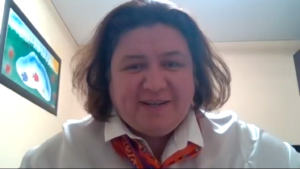 Elena Avakyan, Council Member of the Russian Federal Bar Association intervened on digitalization as a key factor for maintaining lawyers’ independence. In her opinion, Russia reflects all problems with independence that were raised in previous presentations, however, the situation is not as bad as in Belarus. Like in Moldova, there is no lawyers’ monopoly for representation in courts, except in criminal cases. Lawyers may work as employees, which is a relatively new possibility for Russian advocates. What is typical of Russian Bar’s structure is that 85 regional Bars are independent associations, and the Federal Bar is not a supervisory body but rather a creator of common standards. A common problem for the Justice system is that lots of judges have prosecutors’ or public service backgrounds and few of them know lawyer’s practice. Therefore, judicial judgments and decisions are very strict for accused people. Lawyers often face problems with access to courts, state institutions, and prosecutor’s offices. We see digitalization as one of the ways to improve the situation and to make lawyers’ position better towards other actors of justice. In 2020 all Russian bars introduced a unified digital system for lawyers, including a single register of advocates connected with regional databases, videoconferencing, exchange of official documents with state catalogs and archives, a system of assignment of cases, reimbursement of fees, online continuing legal education structure and electronic law office – a tool for every lawyer, etc. The system is designed to deal with various electronic tools used by regional bars and law offices. For the future, we are working on a single financial account for each lawyer to process online income and expenditures. We are also preparing a system for the electronic bar examination.
Elena Avakyan, Council Member of the Russian Federal Bar Association intervened on digitalization as a key factor for maintaining lawyers’ independence. In her opinion, Russia reflects all problems with independence that were raised in previous presentations, however, the situation is not as bad as in Belarus. Like in Moldova, there is no lawyers’ monopoly for representation in courts, except in criminal cases. Lawyers may work as employees, which is a relatively new possibility for Russian advocates. What is typical of Russian Bar’s structure is that 85 regional Bars are independent associations, and the Federal Bar is not a supervisory body but rather a creator of common standards. A common problem for the Justice system is that lots of judges have prosecutors’ or public service backgrounds and few of them know lawyer’s practice. Therefore, judicial judgments and decisions are very strict for accused people. Lawyers often face problems with access to courts, state institutions, and prosecutor’s offices. We see digitalization as one of the ways to improve the situation and to make lawyers’ position better towards other actors of justice. In 2020 all Russian bars introduced a unified digital system for lawyers, including a single register of advocates connected with regional databases, videoconferencing, exchange of official documents with state catalogs and archives, a system of assignment of cases, reimbursement of fees, online continuing legal education structure and electronic law office – a tool for every lawyer, etc. The system is designed to deal with various electronic tools used by regional bars and law offices. For the future, we are working on a single financial account for each lawyer to process online income and expenditures. We are also preparing a system for the electronic bar examination. 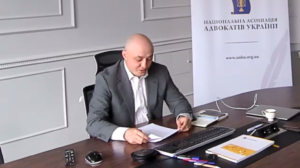 Dr. Vitalii Vlasiuk, Head of the International Law Committee of the Ukrainian National Bar Association and advisor to the Prime Minister of Ukraine, presented the most important challenges for lawyers during the past year. The most important feature was the Covid-19 pandemic. Some limitations were imposed – prohibition of involvement of the public and media in court hearings, many courts did not accept Covid-19 infection as a reason for lawyers’ non-participation in hearings. The Bar undertook several initiatives to deal with the issue – proposal of legislative amendments, talks on covering lawyers with priority lines towards vaccinations, etc. Similar to our Russian colleagues, we also commenced works on digitalization, like single lawyers’ registers, e-cabinets for lawyers, and online training. Some threats have arisen from the actions of the Anti-corruption Agency, which demands from lawyers – members of the Qualification and Disciplinary Committee of the Bar – submission of electronic information on financial income, which is required from all state officials. The Bar refused to argue that lawyers performing their duties in Bar’s organs are not state officials but members of independent self-government. Such action of the Agency is widely seen as an attempt to limit Bar’s independence.
Dr. Vitalii Vlasiuk, Head of the International Law Committee of the Ukrainian National Bar Association and advisor to the Prime Minister of Ukraine, presented the most important challenges for lawyers during the past year. The most important feature was the Covid-19 pandemic. Some limitations were imposed – prohibition of involvement of the public and media in court hearings, many courts did not accept Covid-19 infection as a reason for lawyers’ non-participation in hearings. The Bar undertook several initiatives to deal with the issue – proposal of legislative amendments, talks on covering lawyers with priority lines towards vaccinations, etc. Similar to our Russian colleagues, we also commenced works on digitalization, like single lawyers’ registers, e-cabinets for lawyers, and online training. Some threats have arisen from the actions of the Anti-corruption Agency, which demands from lawyers – members of the Qualification and Disciplinary Committee of the Bar – submission of electronic information on financial income, which is required from all state officials. The Bar refused to argue that lawyers performing their duties in Bar’s organs are not state officials but members of independent self-government. Such action of the Agency is widely seen as an attempt to limit Bar’s independence. 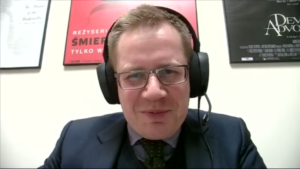 Dr. Mateusz Woliński talked about disciplinary liability and the independence of Polish attorneys-at-law. He noted that there are several dimensions of a lawyer’s liability – legal (civil, administrative, criminal, or professional), social, economic, towards clients and colleagues, etc. He underlined that professional liability is crucial for securing independence. It is the cause why disciplinary proceedings should be conducted by a body independent from the state – in the Polish case within the Bar. Mateusz described in detail existing provisions of liability and their practical functioning. Regulations are set both in-state acts of Parliament and in Bar’s bylaws in the Code of Conduct of attorney-at-law. Independence described in Polish documents is seen as /1/ independence from the state, /2/ independence from the client or any third party, and /3/ independence from the personal interest of a lawyer. Nowadays we can see a tendency to appropriate the sphere of self -governments of all kinds (local or professional) by the state as a sign of lack of trust to independent bodies. Among others, we can observe trials to influence disciplinary proceedings by the Minister of Justice despite existing state large powers in this field. The event was concluded by
Dr. Mateusz Woliński talked about disciplinary liability and the independence of Polish attorneys-at-law. He noted that there are several dimensions of a lawyer’s liability – legal (civil, administrative, criminal, or professional), social, economic, towards clients and colleagues, etc. He underlined that professional liability is crucial for securing independence. It is the cause why disciplinary proceedings should be conducted by a body independent from the state – in the Polish case within the Bar. Mateusz described in detail existing provisions of liability and their practical functioning. Regulations are set both in-state acts of Parliament and in Bar’s bylaws in the Code of Conduct of attorney-at-law. Independence described in Polish documents is seen as /1/ independence from the state, /2/ independence from the client or any third party, and /3/ independence from the personal interest of a lawyer. Nowadays we can see a tendency to appropriate the sphere of self -governments of all kinds (local or professional) by the state as a sign of lack of trust to independent bodies. Among others, we can observe trials to influence disciplinary proceedings by the Minister of Justice despite existing state large powers in this field. The event was concluded by 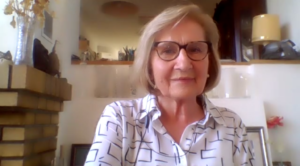 Maria Ślązak, AEA-EAL President, and
Maria Ślązak, AEA-EAL President, and 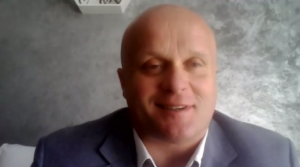 Michał Korwek, Vice-President of the Polish National Bar of Attorneys-at-law. Maria expressed her gratitude to all speakers for providing information and possible remedies. The independence of lawyers has a crucial value for society and for justice. She indicated key factors of independence raised by speakers – independence itself, preserving professional secrecy, and avoidance of conflict of interests. Then freedom of association and establishing strong self-governments – Bars, clear entry requirements, independence from state organs (except courts) disciplinary proceedings, and highest possible standards of knowledge and qualifications including continuing legal education. After all – freedom of choosing lawyers by clients. All those factors can create a strong, independent legal profession playing a key role in providing justice to citizens. Maria said also that it is a common problem for all jurisdictions that a lawyer is often identified with his client. Another one is a limitation of freedom of speech that occurs in many countries, also those seen as “old democracies”. Three good remedies were called – a forum for the exchange of opinions between lawyers, judges, and prosecutors, a committee for constant monitoring of state activities, and a rapid group to react immediately to infringement of lawyers’ rights. Maria pointed out also the significance of international cooperation of lawyers and the creation of a positive image of the profession towards the public. Finally, she informed on the works of the Council of Europe on drafting the Convention on a profession of a lawyer. Michał Korwek thanked Maria for her excellent summary and to all speakers, participants, and organizers. He said that independence is not a general matter far from us but touches each individual lawyer in his daily work.
Michał Korwek, Vice-President of the Polish National Bar of Attorneys-at-law. Maria expressed her gratitude to all speakers for providing information and possible remedies. The independence of lawyers has a crucial value for society and for justice. She indicated key factors of independence raised by speakers – independence itself, preserving professional secrecy, and avoidance of conflict of interests. Then freedom of association and establishing strong self-governments – Bars, clear entry requirements, independence from state organs (except courts) disciplinary proceedings, and highest possible standards of knowledge and qualifications including continuing legal education. After all – freedom of choosing lawyers by clients. All those factors can create a strong, independent legal profession playing a key role in providing justice to citizens. Maria said also that it is a common problem for all jurisdictions that a lawyer is often identified with his client. Another one is a limitation of freedom of speech that occurs in many countries, also those seen as “old democracies”. Three good remedies were called – a forum for the exchange of opinions between lawyers, judges, and prosecutors, a committee for constant monitoring of state activities, and a rapid group to react immediately to infringement of lawyers’ rights. Maria pointed out also the significance of international cooperation of lawyers and the creation of a positive image of the profession towards the public. Finally, she informed on the works of the Council of Europe on drafting the Convention on a profession of a lawyer. Michał Korwek thanked Maria for her excellent summary and to all speakers, participants, and organizers. He said that independence is not a general matter far from us but touches each individual lawyer in his daily work.